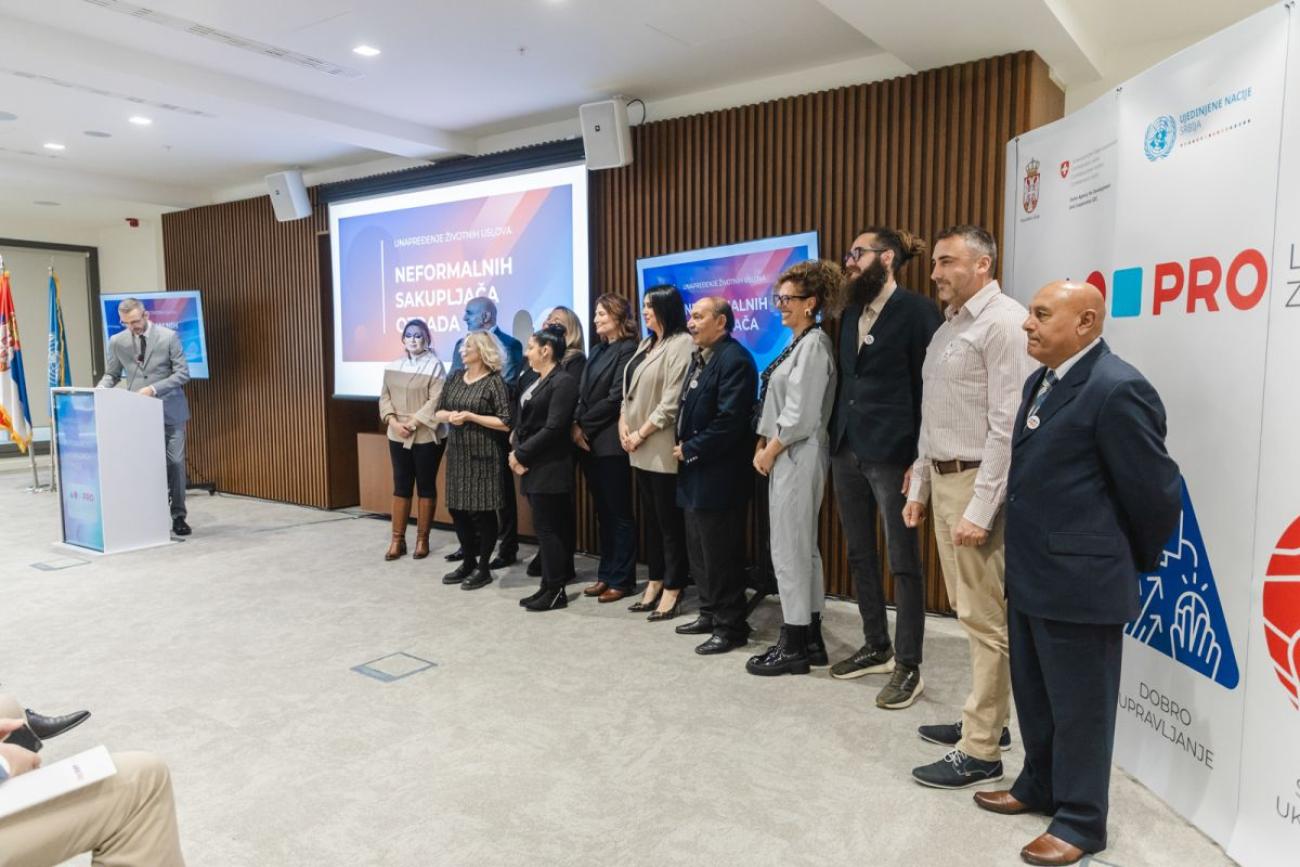Swiss Government Invests 2 Million Euros to Improve Living Conditions of Informal Waste Pickers

Empowering Serbia's vulnerable waste pickers through Swiss-funded initiative, enhancing social inclusion, economic stability, and access to essential services.
Belgrade, 13-November - 2024 - The "PRO – Local Governance for People and Nature" program, implemented by United Nations agencies with
financial support from the Swiss Government, will enhance the living conditions of around 1,600 informal waste
pickers and their families. The Swiss Government has allocated 2 million euros to improve their economic
standing, social inclusion, and access to public services.
Support will focus on 12 municipalities, covering 61 households with a total of 310 family members of informal
waste pickers affected by the modernization of waste management systems and the closure of existing landfills.
This initiative will provide them access to health, education, and social services, as well as training, mentorship, and
support for employment or self-employment.
Swiss Ambassador to Serbia, Anne Lugon-Moulin, highlighted that this partnership initiative reflects the Swiss
Government's commitment to supporting local communities in improving quality of life and reducing the social
exclusion of vulnerable groups.
“This initiative marks an important step in our shared efforts to support Serbia on its path to greater prosperity,
ensuring that economic, social, and environmental goals go hand in hand by supporting the most vulnerable groups
to integrate into the formal labor market and have access to education, healthcare, and social protection,
enhancing quality of life and reaffirming their place in society. This effort goes beyond waste management – it’s
about people,” said the Ambassador. She noted that Switzerland has been a key bilateral partner supporting Serbia
for over 30 years, with this program focusing on governance in local municipalities, environmental protection, and
social inclusion.
Tim Lardner, UNOPS Regional Director for Europe and Central Asia, emphasized the importance of partnership and
joint efforts among all parties involved in this initiative, stating: “UNOPS, UNICEF, and UNFPA, together with the
Government of Serbia, local municipalities, and civil society organizations, with support from the Swiss
Government, are working to address the complex challenges faced by informal waste pickers, one of the most
vulnerable communities in Serbia.”
Ninoslav Jovanović, State Secretary at the Ministry of Labor, Employment, Veterans, and Social Affairs, added, “The
Ministry provides ongoing support to vulnerable groups. Informal pickers of secondary raw materials, many from
the Roma population, collect 80 percent of waste generated in Serbia, yet live and work in inhumane conditions. It
is essential to protect their labor, social, and health rights.”
Matilde Mordt, United Nations Resident Coordinator in Serbia, emphasized that this program focuses on enhancing
local governance, social inclusion, and environmental protection, aligning with key sustainable development goals
such as reducing inequality, poverty, and creating sustainable communities with responsible institutions.
"This intervention approach targets poverty eradication and social inclusion, and also encompasses sustainable
cities and communities and the establishment of accountable and inclusive institutions," she stated, noting that the
aim is to provide sustainable livelihoods and social services, focusing on lasting solutions. “This is not just about
infrastructure improvement but measurable improvements in individuals' lives.”
This intervention is synergized with Serbia’s Solid Waste Program, jointly financed by the European Bank for
Reconstruction and Development and the French Development Agency, under the Ministry of Environmental
Protection.
Tatjana Kaluđerović, Assistant Minister of Environmental Protection, noted that the Ministry is establishing a
sustainable waste management system and plans to close municipal landfills and develop regional centers. This has
created the need for an intervention to assist informal waste pickers dependent on these landfills.
“We recognize that closing unsanitary landfills has a direct impact on informal waste pickers, displacing their
economic activities and causing income loss for their households. However, closing landfills is unavoidable,” stated
Kaluđerović, adding, “this initiative is not only about improving waste management systems but ensuring no one is
left behind as we move forward.”
Milena Popović Martinelli, Assistant Director for the Western Balkans at the European Bank for Reconstruction and
Development, underscored the importance of modernizing waste management in Serbia through strategic
infrastructure investment to protect the environment and support vulnerable communities.
“Through collaboration, we can enhance the social aspect of modernizing solid waste management, ensuring
significant positive impacts on the environment and improving quality of life for minorities and vulnerable groups,”
said Martinelli, emphasizing that the role of waste pickers must not be overlooked in the transition to a green
economy.
François Vince, Deputy Director of the Regional Office for the Western Balkans at the French Development Agency,
stated that waste management is a complex issue that requires collaboration and joint efforts across various
societal layers.
“Waste management requires substantial investments, technology, and regulations, but ultimately, it’s a social
issue. It involves people who need attention and action. We are pleased to see today that UN agencies, ministries,
local governments, and communities are working together to empower them,” said Vince.
The program's support includes the engagement of family assistants as key contact persons who will connect
informal waste pickers and their families with local institutions and services, represent their interests, and help
them exercise their rights according to their specific needs. The program additionally supports local governments
through the development of systematic policies, establishing structures and processes to ensure long-term
solutions for improving the position of informal waste pickers.





